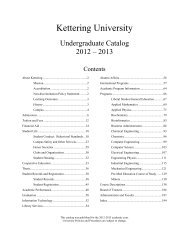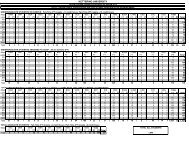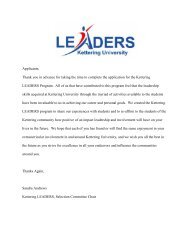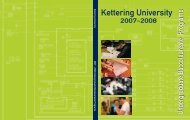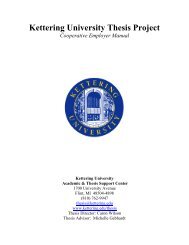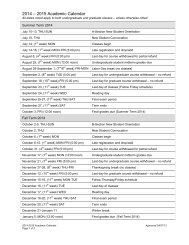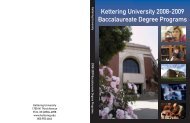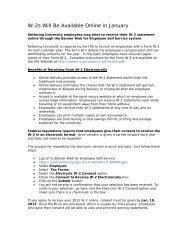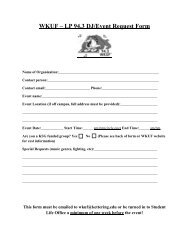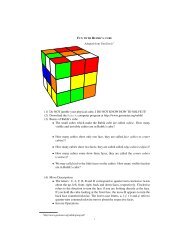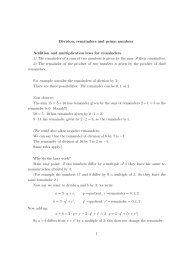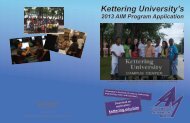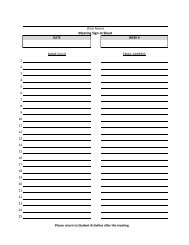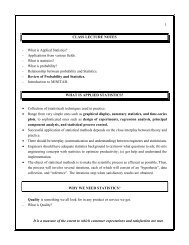2006-2007 Undergraduate Catalog - Kettering University
2006-2007 Undergraduate Catalog - Kettering University
2006-2007 Undergraduate Catalog - Kettering University
Create successful ePaper yourself
Turn your PDF publications into a flip-book with our unique Google optimized e-Paper software.
Copyright & Disclaimer Information: Copyright © 1994, 1995, 1996, 1997, 1998, 1999, 2000, 2001, 2002, 2003, 2004, 2005, <strong>2006</strong>, <strong>2007</strong>. CollegeSource®, Inc. and Career Guidance Foundation. CollegeSource® digital catalogs are derivative works owned and copyrighted by CollegeSource®, Inc. and Career Guidance Foundation. <strong>Catalog</strong> content is owned and copyrighted by the appropriate school. While CollegeSource®, Inc. and Career Guidance Foundation provides information as a service to the public, copyright is retained on all digital catalogs.<br />
Copyright & Disclaimer Information: Copyright © 1994, 1995, 1996, 1997, 1998, 1999, 2000, 2001, 2002, 2003, 2004, 2005, <strong>2006</strong>, <strong>2007</strong>. CollegeSource®, Inc. and Career Guidance Foundation. CollegeSource® digital catalogs are derivative works owned and copyrighted by CollegeSource®, Inc. and Career Guidance Foundation. <strong>Catalog</strong> content is owned and copyrighted by the appropriate school. While CollegeSource®, Inc. and Career Guidance Foundation provides information as a service to the public, copyright is retained on all digital catalogs.<br />
Course Descriptions / 145<br />
IME-404 Sheet Metal Forming 3 0 2 4<br />
Prerequisite: IME-301<br />
This course demonstrates the need for thinking one’s way through<br />
manufacturing situations rather than calculating. Special material properties<br />
important to forming are developed followed by a discussion of strain<br />
generation and measurement techniques including Circle Grid Analysis and<br />
Forming Limit Diagrams. The fabricating processes of shearing, bending,<br />
drawing, and stretching are investigated thoroughly. Special forming<br />
processes and simulation testing are also discussed. The interaction of tooling,<br />
presses, and lubrication completes the study of sheet metal forming.<br />
Laboratory experiences on production-grade presses complement the lecture.<br />
Terms Offered: Summer, Fall<br />
IME-405 Casting Processes 2 0 4 4<br />
Prerequisite: IME -301<br />
Green sand casting, lost foam casting, permanent mold casting and die casting<br />
are discussed. The interrelationships between part design, solidification mode,<br />
casting process parameters and the resulting microstructure and properties<br />
are examined. Terms Offered: Winter, Spring<br />
IME-406 Joining Processes 2 0 4 4<br />
Prerequisite: IME-301<br />
Students will learn how to evaluate, identify and specify the appropriate means<br />
for joining materials based on loading requirements, characteristics of the<br />
materials to be joined, practicality, and economic impact. They will be<br />
expected to communicate this material effectively in oral, written, and visual<br />
form. Terms Offered: Winter, Spring<br />
IME-408 Automation with Robotics and CNC 3 0 2 4<br />
Prerequisites: IME-301, MECH-100<br />
The basic concepts of industrial robot and CNC theory and applications are<br />
presented. Topics include the physical robot components and peripherals,<br />
robot classifications and capabilities, basics of machining operation principles,<br />
robot and CNC machine safety, integration in design and function of robot<br />
and CNC in workcells, justification of investment, work-holding, path<br />
planning, motion control, virtual robot and CNC, programming languages,<br />
end-effector design and work-cell design. Computer communication with<br />
equipment is covered. Terms Offered: Winter, Spring<br />
IME-409 Computer Integrated Manufacturing 3 0 2 4<br />
Prerequisites: IME-301, MECH-100<br />
Study the current status of CIM, with definition, case studies, citing obstacles<br />
and future trends and development. Some key components of CIM and<br />
hierarchy of operation in a manufacturing facility are studied and correlated.<br />
They include CAD-CAM link, numerical control, automation, production<br />
and manufacturing control, control through proper communication and<br />
computer supervisory control, robotics control, process planning. Short<br />
summary of planning, implementation, and managing of a CIM environment<br />
will also be covered. The students will conduct experiments and projects on<br />
creating a CIM environment using computer supervisory control. Terms<br />
Offered: Summer, Fall<br />
IME-412 Applied Control Systems Design 3 0 2 4<br />
Prerequisite: Senior I Standing<br />
An introductory course designed to introduce students to the various computer<br />
controlled systems used for data collection, analysis and reporting. Various<br />
hardware, software, sensors, and human resources required to implement<br />
effective control systems will be studied. Students will be engaged in handson<br />
laboratory exercises requiring them to configure, write programs to solve<br />
various assigned problems through individual and/or group efforts. In<br />
addition, students will be given assignments to be completed outside of class.<br />
By the end of the course the student should have good understanding effective<br />
use of computerized control systems. Terms Offered: Winter, Spring<br />
IME-422 System Modeling II: Production Systems & Simulation<br />
Prerequisites: IME-321 and IME-332 or MATH-408 4 0 0 4<br />
In this course, the student will study the problem of dealing with the flow of<br />
materials from the purchase of raw materials to the distribution of the finished<br />
product. It will focus on the technical questions of forecasting, inventory<br />
control, material requirement planning, aggregate planning, capacity planning<br />
and control, production scheduling, and pull manufacturing. Terms Offered:<br />
Summer, Fall<br />
IME-423 Systems Modeling III: Stochastic Models 4 0 0 4<br />
Prerequisite: IME-321<br />
Stochastic models in operations research; Review of basic probability, discrete<br />
time Markov chains; continuous time Markov chains; discrete and continuous<br />
phase type distributions; birth-and-death processes; elementary queuing<br />
models involving Poisson arrivals and exponential service times; advance<br />
queuing models; basic concepts in simulation and simulation of various<br />
processes. Terms Offered: Summer, Fall<br />
IME-453, Systems Analysis III: Scheduling 4 0 0 4<br />
Prerequisite: IME-352<br />
This course concentrates on scheduling for the production and operations<br />
systems to help engineering managers determine the best fiscally sound<br />
decisions. Special effort is made in adapting the contemporary “Beyond MRP”<br />
issues. Terms Offered: Summer, Fall<br />
IME-454 Senior Design Project 2 0 4 4<br />
Prerequisite: final term on campus or Department Head approval<br />
This course provides the student with the challenge of integrating and<br />
synthesizing general engineering knowledge particularly in industrial and<br />
manufacturing disciplines, into creatively solving real-world, open-ended<br />
problems in a team setting. This requires defining a project work plan,<br />
developing the problem statement, objectives and evaluation criteria; data<br />
collection; selection of appropriate analytical and production techniques;<br />
developing and integrating recommendations; justifications of recommended<br />
course of action; and written and oral presentation of results. The project<br />
could involve production systems or product design where the planning can<br />
extend to product realization.Terms Offered: All<br />
IME-462 Work Design II: Ergonomics 3 0 2 4<br />
Prerequisite: IME-361<br />
Fundamentals of work design are built upon to ground the student in human<br />
factors and ergonomics of work design. Topics include applied job design,<br />
manual material handling, cumulative trauma disorders, hand tool design,<br />
design of controls and displays, and ergonomic and human factors of product<br />
design. Terms Offered: Summer, Fall<br />
IME-471 Quality Systems I: Quality Assurance 4 0 0 4<br />
Prerequisite: IME-332 or MATH-408 or MATH-226<br />
This course covers the basics of modern methods of quality control and<br />
improvement that are used in the manufacturing and service industries. It<br />
includes quality philosophy and fundamentals, statistical methods of quality<br />
improvement, concept of variation and its reduction, statistical process control,<br />
acceptance sampling, designed experiments in quality improvements, and<br />
quality in the service sector. Deming’s quality concepts will also be discussed.<br />
Terms Offered: Winter, Spring<br />
IME-474 Design for Manufacture and Assembly 3 0 2 4<br />
Prerequisite: IME-301<br />
This course develops skills needed to prepare a product functional<br />
specification for an existing product, at the product subfunctional group and<br />
individual part levels. The development and application of a function structure<br />
diagram is developed for a product. Creative concepts generation tools are<br />
learned to generate alternate mechanisms to generate the functions of a<br />
product. The PUGH concept selection method is utilized to select top ideas<br />
in each subfunctional group. New product level concepts are generated by<br />
combining the best concepts in each subfunctional group. The BDI Design<br />
for Assembly method is applied to existing products to determine a path for<br />
part consolidation. The DFA Redesign Concept Matrix is used to create<br />
novel assembly concepts. Concepts in the course are taught through lecture<br />
and facilitated practicum. Terms Offered: Summer, Fall<br />
IME-502 Composite Manufacturing 2 0 2 4<br />
Prerequisite: IME-301<br />
This course investigates the methods for fabrication and testing of composites.<br />
Lecture is supplemented by laboratory exercises for flat and 3-D composite<br />
panels and sandwich panels. Terms Offered: Winter, Spring



